By Stuart Nicolson
BBC Scotland News
Humza Yousaf has been elected to succeed Nicola Sturgeon as SNP leader and Scotland's next first minister. He was widely seen as being the preferred candidate of the SNP establishment - including Ms Sturgeon herself. The health secretary was endorsed by far more MSPs and MPs than his two rivals, with Deputy First Minister John Swinney predicting that Mr Yousaf would "complete our journey to independence".He is undoubtedly the most experienced of the three leadership contenders, having served in government since 2012 in roles including justice secretary and transport minister.
His supporters say he is a polished communicator who is best placed to unite the party and maintain the power-sharing agreement with the Scottish Greens after what has been a deeply fractious leadership contest.
The 'continuity candidate'
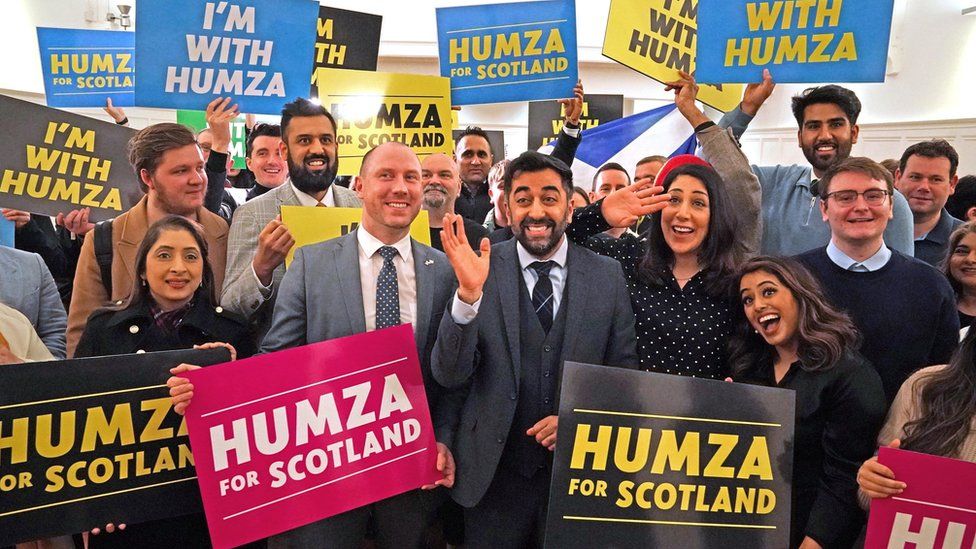
IMAGE SOURCE,PA MEDIAImage caption,
Mr Yousaf had the support of far more SNP MPs and MSPs than his two leadership rivals, Mr Yousaf is a close ally of Ms Sturgeon and is generally seen as the "continuity candidate" who would seek to continue the work of the outgoing first minister.
He is the only one of the three contenders to have said they would challenge the UK government's block on Ms Sturgeon's controversial gender recognition reforms in the courts, arguing that independence will only be won if the party continues to push "progressive values".
But he has stressed that he would only go to court if the legal advice suggested that a challenge could be successful.
Mr Yousaf has distanced himself from Ms Sturgeon's plan to use the next election as a de facto referendum, saying that he would instead seek to build a "consistent majority" in favour of independence and it "isn't good enough to have polls that put support for independence at 50% or 51%".
But he has attempted to reach out to more impatient independence supporters by saying he would consider calling a snap Holyrood election to test support for leaving the UK.
Mr Yousaf also rejected claims that the party hierarchy was doing everything it could to ensure he won the leadership contest following allegations that the shortened campaign was specifically designed to favour him. And he has said he would be willing to listen to concerns over controversial policies such as proposals for a new national care service and the bottle return scheme.
'Do things my own way'
Speaking to the BBC Scotland's Sunday Show earlier in the contest, Mr Yousaf insisted that he was his "own man and will do things my own way".
Mr Yousaf added: "I have a lot of admiration, as you would imagine, for the excellent work Nicola Sturgeon has done as first minister.
"But she had a certain leadership approach. Mine would be less inner circle and more big tent."
Critics claim that Mr Yousaf has "failed upwards" with few accomplishments to show for his time in government, with Labour's Jackie Baillie describing him as "the worst health secretary on record" who "now aspires to be the worst first minister on record".
But the most withering assessment has come from his fellow SNP leadership contender Kate Forbes, who told Mr Yousaf during a live STV debate that: "You were transport minister and the trains were never on time, when you were justice secretary the police were stretched to breaking point, and now as health minister we've got record high waiting times".
Mr Yousaf's clashes with Ms Forbes were a key feature of the contest, with Mr Yousaf claiming his rival's views on social issues such as gay marriage, trans rights and abortion would see the party "lurch to the right".
But Mr Yousaf has also faced questions over his failure to take part in the final vote on gay marriage in 2014, which he said was due to having a vital meeting about a Scot who was being held on death row in Pakistan on blasphemy charges.
Alex Salmond, who was first minister at the time, told Sky News that Mr Yousaf had missed the vote because of religious pressure from a Glasgow mosque - an allegation Mr Yousaf has strongly denied.
The first Muslim leader of a major UK party
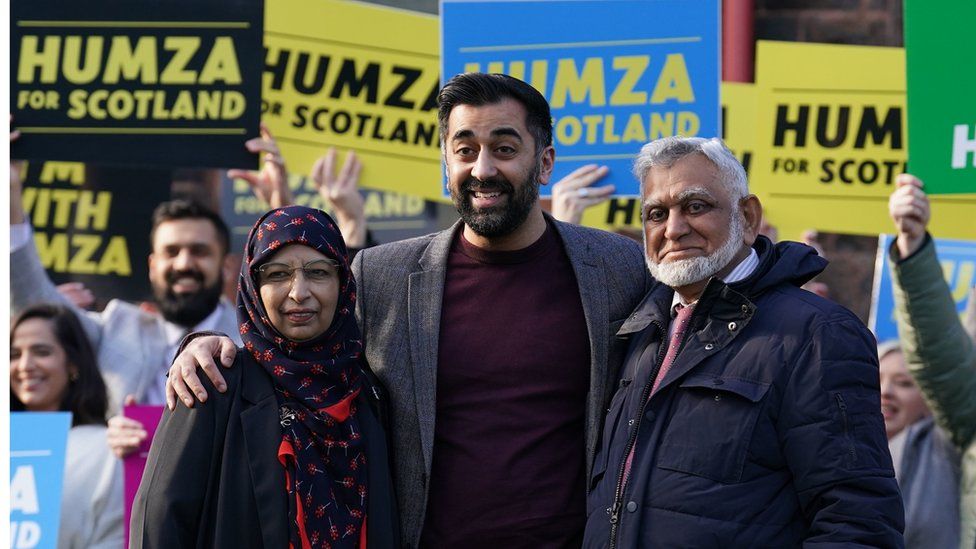
IMAGE SOURCE,PA MEDIA Image caption
Mr Yousaf with his parents Shaaista and Muzaffar
When the 37-year-old is confirmed as Scotland's first minister, he will make history as the first ethnic minority leader of a devolved government and the first Muslim to lead a major UK party.
His father is originally from Pakistan and emigrated to Scotland with his family in the 1960s, while his mother was born into a South Asian family in Kenya, and Mr Yousaf has often spoken of the racist abuse he has received. He was forced to call the police after allegedly receiving threats at the start of the leadership contest, with a 25-year-old man and 35-year-old woman being arrested and charged.
Mr Yousaf was educated at the Hutchesons' Grammar private school in Glasgow, where he was two years behind Scottish Labour leader Anas Sarwar.
After studying politics at Glasgow University, he briefly worked in a call centre before becoming a parliamentary assistant to SNP MSP Bashir Ahmad and later an aide to Alex Salmond.
Mr Yousaf was elected as a list MSP for the Glasgow region in 2011, with Mr Salmond promoting him to minister for Europe and international development just a year later.
He became transport minister in 2016 after winning Glasgow Pollok from Labour, which made him the first ethnic minority candidate to win a constituency seat in the Scottish Parliament.
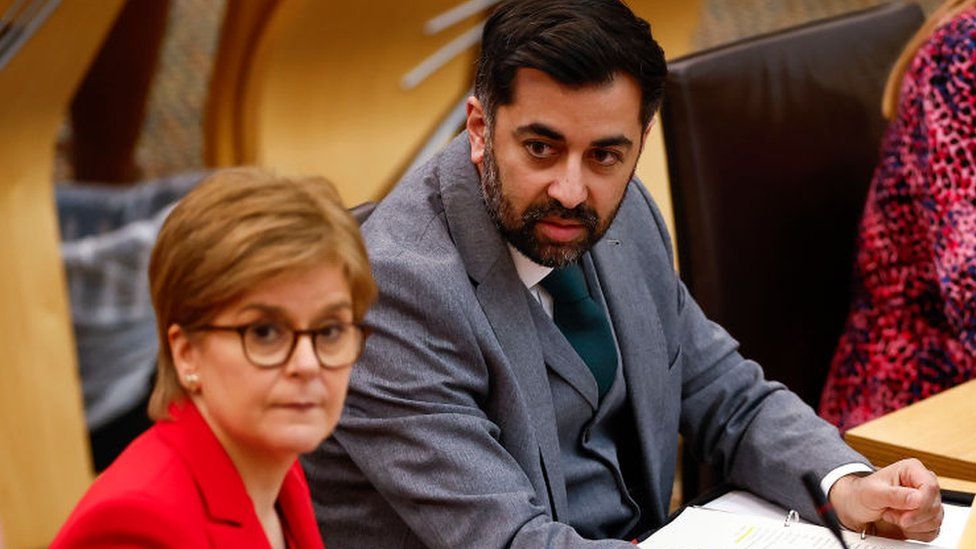
IMAGE SOURCE,GETTY IMAGESImage caption,
Mr Yousaf was a close ally of Nicola Sturgeon throughout her eight years as first minister
Six months after taking on the transport portfolio, Mr Yousaf faced the embarrassment of being fined £300 and having six penalty points added to his licence after being stopped by the police while driving his friend's car without the proper insurance.
He also faced criticism for the performance of ScotRail after Abellio took over the contract to run the rail franchise, which ultimately led to it being nationalised. Mr Yousaf was promoted again in 2018 when Ms Sturgeon named him as the new justice secretary as part of a reshuffle of her cabinet team. But his flagship hate crime bill was mired in controversy over fears that the new offence of "stirring up hatred" could have a major impact on freedom of speech.
Critics said the legislation could lead to libraries and bookshops being prosecuted for having contentious books on their shelves, with the new law also potentially criminalising people for private conversations in their own home. The bill was described by former SNP deputy leader Jim Sillars as being "one of the most pernicious and dangerous pieces of legislation ever produced by any government in modern times in any part of the United Kingdom".
It was eventually passed by MSPs in March 2021 after a series of changes were made, but has still not become law.
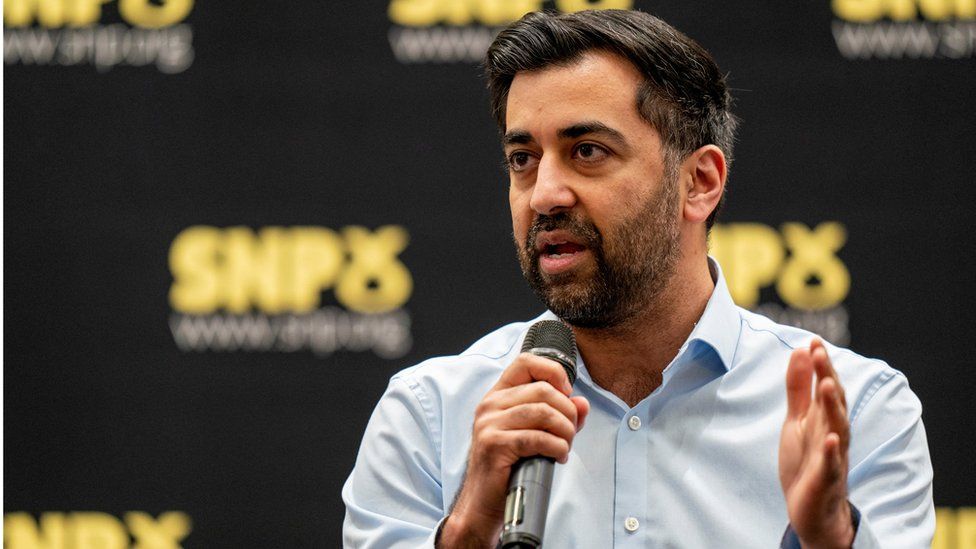
IMAGE SOURCE,REUTERS
Mr Yousaf was also criticised for tweeting about his "disgust" over a video supposedly showing Ranger player using sectarian language that quickly turned out to be fake.
And he dismissed concerns about the state of Scotland's police buildings as "hyperbole" just hours before the ceiling collapsed at Broughty Ferry police station near Dundee. Mr Yousaf had recently moved to the town.
Within three weeks of becoming health secretary in May 2021, Mr Yousaf apologised for any "undue alarm" he had caused by wrongly claiming that 10 children had been hospitalised "because of Covid".
He also famously fell off a knee scooter that he was using in the Scottish Parliament while recovering from a ruptured Achilles tendon that he had suffered while playing badminton.
When video of his tumble was tweeted by BBC Scotland political editor Glenn Campbell, Mr Yousaf replied: "If anyone else had fallen over while on crutches, a knee scooter, or in a wheelchair would your first instinct be to film it & tweet out?"
His time as health secretary has been characterised by soaring hospital waiting times - although Mr Yousaf points out that these problems are not unique to Scotland, and that the country is the only part of the UK to have avoided strikes by NHS staff.
Mr Yousaf's supporters - who include the SNP's Westminster leader Stephen Flynn as well as Mr Swinney - point to his achievements, such as delivering the Queensferry Crossing on time and under budget while he had responsibility for transport and falling crime figures while he was justice secretary.
Mr Flynn said he believed Mr Yousaf was best placed to tackle the country's economic challenges and praised his plan to fast-track the expansion of childcare to one and two-year-olds as a "real gamechanger for both working families and the wider economy".
Nursery discrimination row
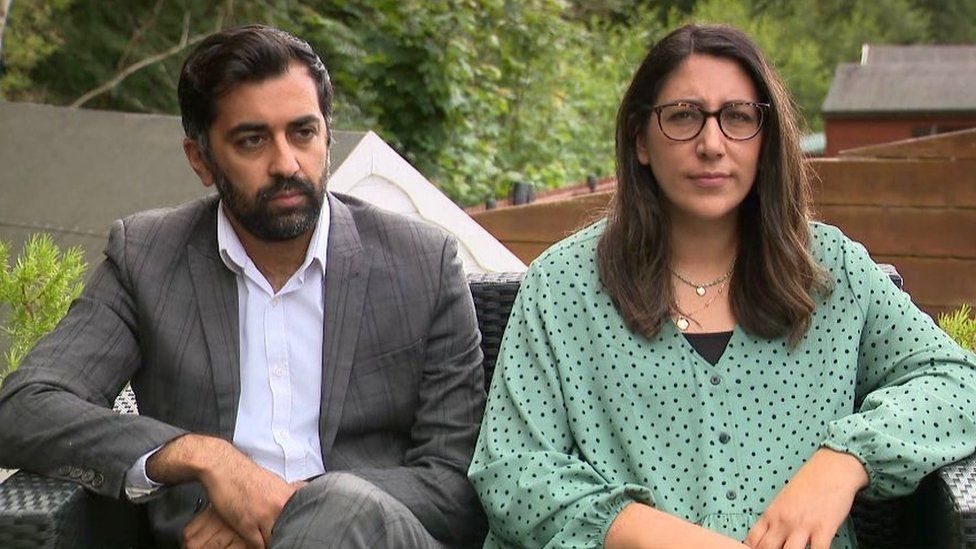
Image caption,
Mr Yousaf and his wife Nadia El-Nakla recently dropped legal action against a nursery they had accused of discrimination
Mr Yousaf and his wife Nadia El-Nakla - an SNP councillor in Dundee - recently dropped a £30,000 legal claim against a nursery they had accused of discrimination.
The couple claimed to have been told there was no space for their daughter at the nursery in Broughty Ferry, but that applicants with "white Scottish-sounding names" were accepted.
The nursery had said any claim that it was not open and inclusive to all was "demonstrably false" and that it had been forced to spend tens of thousands of pounds "defending our small nursery against their false claims".
The Care Inspectorate had previously upheld a formal complaint made by Mr Yousaf and Ms El-Nakla about the nursery.
Profile: The SNP's new leader Humza Yousaf
After being voted leader of the Scottish National Party, we ask - who is Humza Yousaf?




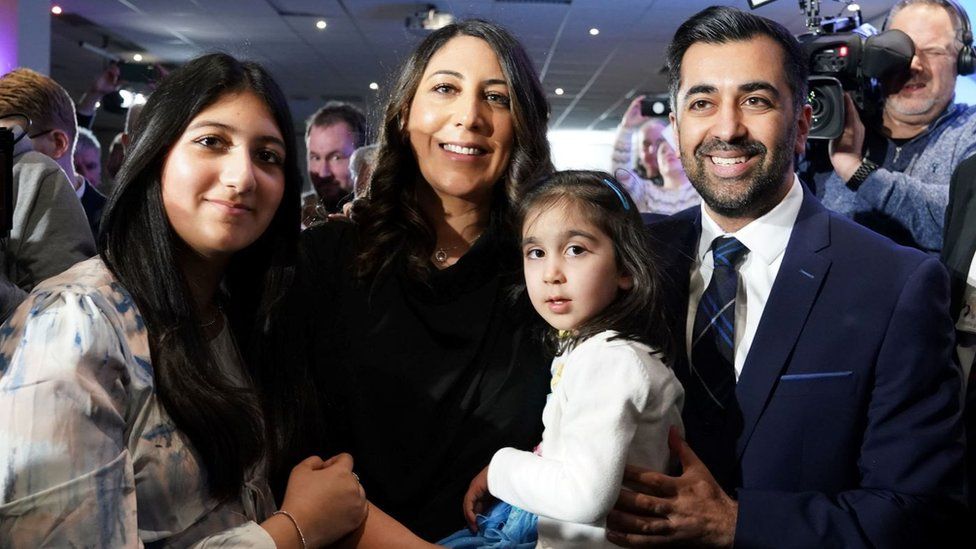
 IMAGE SOURCE,PA MEDIAImage caption,
IMAGE SOURCE,PA MEDIAImage caption, IMAGE SOURCE,PA MEDIA Image caption
IMAGE SOURCE,PA MEDIA Image caption IMAGE SOURCE,GETTY IMAGESImage caption,
IMAGE SOURCE,GETTY IMAGESImage caption, IMAGE SOURCE,REUTERS
IMAGE SOURCE,REUTERS Image caption,
Image caption,

